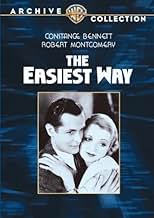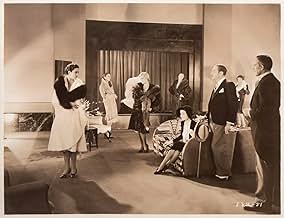Laura from a poor family rejects her boyfriend for a wealthy older man. She falls for a younger journalist, leaves the wealthy man but struggles financially.Laura from a poor family rejects her boyfriend for a wealthy older man. She falls for a younger journalist, leaves the wealthy man but struggles financially.Laura from a poor family rejects her boyfriend for a wealthy older man. She falls for a younger journalist, leaves the wealthy man but struggles financially.
- Director
- Writers
- Stars
- Awards
- 1 win total
- Hotel Clerk
- (uncredited)
- Brockton Associate
- (uncredited)
- Women at Cook-Out
- (uncredited)
- Andy Murdock
- (uncredited)
- Chris Swoboda - Laura's Suitor
- (uncredited)
- Bud Williams
- (uncredited)
- Mrs. Clara Williams
- (uncredited)
- Mr. Gensler
- (uncredited)
- Tillie Murdock
- (uncredited)
- Alfred - Brockton's Butler
- (uncredited)
- Director
- Writers
- All cast & crew
- Production, box office & more at IMDbPro
Featured reviews
This is a pre-Code film, but it's a mixed bag relative to moralistic messaging, and that was a little frustrating. Its premise is born out of the Depression, and it being tough for working families to make ends meet. In a common theme from the era, a sudden event promises a change in fortune: the meeting of a rich man. It comes at a cost, however, and "the easiest way" out of one's problems is soon shown to be the hard way.
We initially meet a large family in an early morning scene that was sharp and full of life. Kids of all ages sharing beds are being awakened by their mother and sent on errands or called to get their breakfast. The father announces he is tired of the physical strain of working as a longshoreman and wants to rely on his kids, so he would like his adolescent son to drop out of school so that he can get a job at a construction site catching red-hot rivets thrown by workers in a pail. Yikes. We're not in 2023 here, we're in 1931 - although in light of Iowa and other state legislatures moving forward with loosening child labor laws with little ability to hold businesses accountable in the event of injury or death, hey, perhaps we're also looking at the future here! But I digress. One of his adult daughters (Anita Page) is soon to marry a hard-working blue-collar guy (Clark Gable). The other (Constance Bennett) is a sensible saleswoman, but after being discovered as a modelling prospect, becomes the lover of the top boss (Adolphe Menjou). Her sugar daddy allows her to live a life of luxury and support her family, but the immorality of the relationship (as seen in the eyes of the era) causes her to be ostracized by her mother and brother-in-law, and she's conflicted when she meets someone she truly loves (Robert Montgomery).
It's a fantastic cast with all five of those actors, and these were early roles for Montgomery and Gable, which is a bonus. Director Jack Conway keeps things moving along with great pace as well, and occasionally there are some fine shots, such as the one of Bennett and Montgomery talking at a mountain lake, their backs turned to the camera and the reflection of the trees in the water in the background. We never really see any passion between Bennett and Menjou so it's decidedly tame for a pre-Code film, and that's almost certainly due to censors taking exception to Bennett's life being shown as too alluring before eventually getting to its message and hacking it up at a local level, as Mark Viera describes in Forbidden Hollywood. The film also vacillates melodramatically as it plays out. I liked that part of this showed the position Bennett's character was in, between a rock and a hard place, with her friend saying that the men "held all the trumps," but wish it had taken more of a stand on this hypocrisy.
And that's where most of my discontent came from, the judgment of Bennett's character, while there was absolutely none of this for Menjou's. The most visible form of this comes from Clark Gable's character, who clearly represents the film's moral compass, given the somewhat nauseating forgiveness scene, complete with Christmas trappings, at the end. Even Bennett herself feels she is wrong to be living with a man who is "not the marrying kind," and comes off as more miserable than some of the other strong pre-Code characters and the leading ladies who played them. At least she's not condemned to death so this doesn't feel completely like a post-Code film, but it's close.
This little film is strictly soap opera, but it's well presented and makes a pleasant diversion. The production values are good, especially in the opening sequence which reveals the inside of a tenement flat, and causes the viewer to appreciate the trouble MGM expended on even its small pictures.
Beautiful Constance Bennett is very convincing as a woman who frankly admits her moral standing -- until true love complicates everything. Urbane Adolphe Menjou, as the rich businessman who controls Bennett, is slightly more sympathetic than usual in a role he could probably have played in his sleep. And Robert Montgomery gives his patented friendly portrayal as the steadfast fellow who earnestly loves Bennett -- until he is told the truth of her situation.
A fine supporting cast helps the proceedings: tough-talking Marjorie Rambeau as an aging model out to squeeze every penny possible from the male animal; lazy J. Farrell MacDonald & careworn Clara Blandick as Bennett's poor parents; blonde Anita Page as Bennett's lively younger sister; and sturdy Clark Gable, as Page's laundryman boyfriend, who would eventually supplant Montgomery as MGM's favorite heartthrob.
Movie mavens will recognize jovial Dell Henderson and stately Hedda Hopper, both uncredited as Bennett's Colorado hosts.
Obviously tame by today's standards, it's still not hard to see why The Easiest Way ruffled feathers back in the day. Essentially the plot finds Bennett as Laura Murdock, a poor shop girl who grows so tired of sharing a cramped tenement home with her large family, where three to a bed is the norm, she lands herself a rich older man (Menjou) and becomes a kept mistress. This ostracises her greatly and stuck in a loveless relationship, she's in a bad place emotionally. Hope comes in the form of Jack Madison (Montgomery), and the two hit it off right away and fall in love, but can Laura leave behind the wealth for the sake of love? Just what is the easiest way?
And so it is, running at under 75 minutes, pic gets away with what it can by ensuring the taboo nature of the story centre is cunningly evident. Conway and Mescall show some deft ambition with mobile camera work and nice framing shots out in the exteriors. Performances are all credible, with Gable serving early notice of what was to come in his career, and the ending, one of many filmed as the makers searched for tonal closure, works just fine to linger as a bittersweet aftertaste.
Montgomery isn't in it nearly enough given that he is playing one of the key characters, and the big issue of women striding out for their right to challenge society's stone-age ideals is inadequately unfurled. Other than that this is a thoroughly enjoyable piece of of pre-code classic cinema. 7/10
Did you know
- TriviaLaura's overdue hotel bill of $62.50 would equate to over $1,200 in 2022.
- GoofsWhile on a trail ride in Colorado, Jack invites Laura to take in his pet view. The view is of Yosemite in California.
- Quotes
Jack Madison: You know, I may be gone two, maybe three months. What are you going to do? Are you going to be all right?
Laura Murdock: Mmm-hmm. I'll go back to my old job, commercial posing.
Jack Madison: Not one of these artists that, eh...
Laura Murdock: No. Nothing worse than undies, darling.
- Alternate versionsThe scene where Elfie enters Laura's father's house, (47 minutes), Elfie is played by Marjorie Rambeau and she is wearing a chinchilla trimmed coat. I have two film still photographs showing Marie Prevost as Elfie wearing a fox trimmed coat and a different hat. Laura is wearing exactly the same outfit and the set on which it was filmed is exactly the same.
- ConnectionsAlternate-language version of Quand on est belle (1932)
- SoundtracksThe Sidewalks of New York
(1894) (uncredited)
Music by Charles Lawlor
Played as background music in the opening scene
Details
Box office
- Budget
- $310,000 (estimated)
- Runtime
- 1h 13m(73 min)
- Color




































